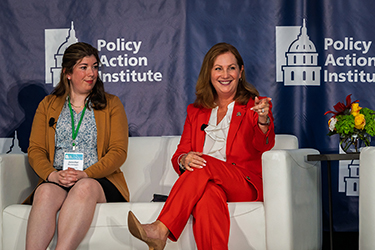Public health advocates who cultivate relationships with decisionmakers and understand their motivations are more likely to be successful turning research into policy.
That was one of many pearls of advice provided by speakers during the first day of APHA’s sixth annual Policy Action Institute Monday.
Speakers at the sold-out event in Washington, D.C., stressed the importance of building coalitions, forming stakeholder relationships and telling compelling stories to advance public health policy.
Elected leaders rarely know the subtleties of public health issues, experts said. It is up to health professionals to translate science, provide advice and propose recommendations on public health, Shelley Hearne, DrPH, MPH, director of the Lerner Center for Public Health Advocacy and professor of public health practice at Johns Hopkins Bloomberg School of Public Health, told participants.
“Understand who are key to your policy position and what matters to them,” said Hearne, an APHA member and co-author of a recently published APHA Press book on policy engagement. “Get into the head of the policymaker. You want them to hear the case you are making.”
Using clear, simple language in messaging is also important, she said.
Hearne’s words resonated with institute participant Anika Kalra, MS, a health policy and engagement analyst at the New York City Department of Health and Mental Hygiene, who took part in the event virtually.
 “This is a really good point about communication — making things accessible for all and not using rhetoric that only public health people understand,” she said in the meeting’s virtual chat.
“This is a really good point about communication — making things accessible for all and not using rhetoric that only public health people understand,” she said in the meeting’s virtual chat.
Even with today’s divisive political climate, it is possible to find common ground. In their conversation at the institute, Jennifer Mandelbaum, PhD, MPH, a Democrat serving in the New Hampshire House of Representatives, and Kimberly Moser, RN, a Republican in the Kentucky House of Representatives, agreed on many points, including the need for health advocates to be confident in reaching out to their state representatives.
“You don’t need a snazzy policy brief,” Mandelbaum said. “Just get to the gist of it. Let’s have a conversation. We can work together on a policy solution.”
While some people can be apprehensive about approaching lawmakers, they shouldn’t be, said meeting speaker John Kasich, a former Republican governor of Ohio, who addressed the relationship between health advocates and policymakers.
“Politicians are just like us,” Kasich said. “They just happen to be elected. Don’t be intimidated. One minute they are in office, the next minute they are out. Treat them like normal folks, but with respect.”
Institute participants will take that lesson with them when they visit Capitol Hill Wednesday. About 100 people are expected to visit with their elected members of Congress and staff to discuss topics such as public health funding, climate change, access to care and more.
Above: Jennifer Mandelbaum, left, a Democrat serving in the New Hampshire House of Representatives, and Kimberly Moser, a Republican in the Kentucky House of Representatives, take part in the event. Below: An attendee asks a question during a Q&A portion of the program. (Photos by Gayatri D. Malhotra)